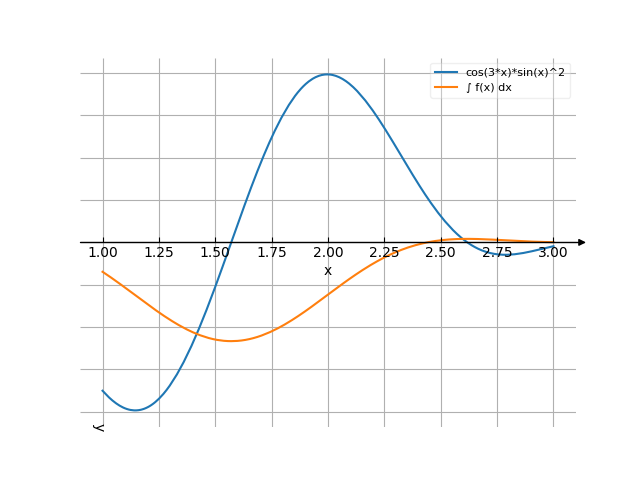Integral of cos3x(sinx)^2 dx
The solution
3 / | | 2 | cos(3*x)*sin (x) dx | / 1
Integral(cos(3*x)*sin(x)^2, (x, 1, 3))
-
Rewrite the integrand:
-
Integrate term-by-term:
-
The integral of a constant times a function is the constant times the integral of the function:
-
Rewrite the integrand:
-
There are multiple ways to do this integral.
Method #1
-
Let .
Then let and substitute :
-
Integrate term-by-term:
-
The integral of a constant times a function is the constant times the integral of the function:
-
The integral of is when :
So, the result is:
-
-
The integral of is when :
The result is:
-
Now substitute back in:
-
Method #2
-
Rewrite the integrand:
-
Integrate term-by-term:
-
The integral of a constant times a function is the constant times the integral of the function:
-
Let .
Then let and substitute :
-
The integral of is when :
Now substitute back in:
-
So, the result is:
-
-
Let .
Then let and substitute :
-
The integral of is when :
Now substitute back in:
-
The result is:
-
Method #3
-
Rewrite the integrand:
-
Integrate term-by-term:
-
The integral of a constant times a function is the constant times the integral of the function:
-
Let .
Then let and substitute :
-
The integral of is when :
Now substitute back in:
-
So, the result is:
-
-
Let .
Then let and substitute :
-
The integral of is when :
Now substitute back in:
-
The result is:
-
-
-
So, the result is:
-
-
The integral of a constant times a function is the constant times the integral of the function:
-
Let .
Then let and substitute :
-
The integral of is when :
Now substitute back in:
-
So, the result is:
-
The result is:
Now simplify:
Add the constant of integration:
The answer is:
/ | 5 3 | 2 4*sin (x) sin (x) | cos(3*x)*sin (x) dx = C - --------- + ------- | 5 3 /
2 2 2 2
7*sin (1)*sin(3) 2*cos (3)*sin(9) 2*cos (1)*sin(3) 7*sin (3)*sin(9) 2*cos(1)*cos(3)*sin(1) 2*cos(3)*cos(9)*sin(3)
- ---------------- - ---------------- + ---------------- + ---------------- - ---------------------- + ----------------------
15 15 15 15 5 5
=
2 2 2 2
7*sin (1)*sin(3) 2*cos (3)*sin(9) 2*cos (1)*sin(3) 7*sin (3)*sin(9) 2*cos(1)*cos(3)*sin(1) 2*cos(3)*cos(9)*sin(3)
- ---------------- - ---------------- + ---------------- + ---------------- - ---------------------- + ----------------------
15 15 15 15 5 5

Use the examples entering the upper and lower limits of integration.

![Find the integral of y = f(x) = cos3x(sinx)² dx (co sinus of e of 3x(sinus of x) squared) - with detailed solution [THERE'S THE ANSWER!] cos3x(sinx)^2](/media/krcore-image-pods/176/hash/indefinite/6/be/6e2883497758da1da83b73922f705.png)
 Integral of 2*x*exp(-x)
Integral of 2*x*exp(-x)
 Integral of dx/e^(2*x)
Integral of dx/e^(2*x)
 Integral of 1/(x-x^2)
Integral of 1/(x-x^2)